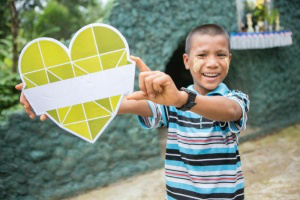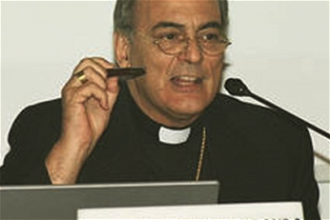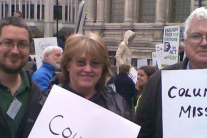CAFOD Reflection: Breaking down the structures of sin

Martin from Myanmar, with CAFOD Climate Change Heart. Campaigners are saying what they love that is at risk due to climate change. Martin said 'the human race' Pic: Ben White
Sounding very much like Pope Francis, his compatriot, Bishop Marcelo Sánchez Sorondo confirmed at the CAFOD Pope Paul VI lecture in London in November that the Holy Father would publish an important document on climate change this year. He spoke with real authority in his capacity as Chancellor of the Pontifical Academy of Sciences and the Pontifical Academy of Social Sciences in the Vatican and it is a reasonable guess that he will have input in the papal document. This is likely to be another best seller like Evangelii Gaudium of 2013 which is available even from secular book shops. The Pope aims to influence decisions to be taken in a series of United Nations meetings on development and the global environment culminating in a summit in Paris in December and, if Bishop Marcelo’s address is anything to go by, the rich and powerful are likely to find it every bit as disturbing as the Pope’s comments on the inadequacies of capitalism and reliance on trickle down economic policies in combating global poverty.
The Pontifical Academies share the view of 95 per cent of environmental scientists that global warming is driven “decisively” by human activities and Bishop Marcelo showed a Francis-like shrewdness and lack of inhibition in identifying the people who were driving increasing inequality and the destruction of the environment. In the lecture and in his responses to questions from the audience the bishop several time referred to the lobbyists and lawyers employed by multinational companies who took no account of the common good or democracy and “were creating a plutocracy in which the heavy use of fossil fuels were causing global warming and acidification of the oceans.” He said that the mechanisms which these companies were oiling amounted to “structures of sin” whose appalling outcome in environmental and social degradation and unjust inequalities within and between nations did not show up when viewed only through the lens of monetary profit.
This standard has no place for the pursuit of policies to promote the sustainable development of the natural environment. Neither has it anything to say about the spread of “forced labour, prostitution, organ-trafficking, and the use of drugs as a method of corruption” which the Bishop argued stemmed from the lack of a clear orientation towards the common good. The result is that the great majority of the people who are most at risk from climate change are in the least developed countries, among the 400 million poorest people in the world – more than 175 million of them live on 77p or less a day.
This Lent, CAFOD’s focus will be very much on supporting Pope Francis’s aims through campaigning for an effective international agreement to slow climate change. It is focussing attention on its own work with partner organisations in the poorest countries to help them to develop sustainable agricultural production adapted to changing climactic conditions and to secure shelter, medicine, and clean water sources. CAFOD is also helping its partners to increase the preparedness of poor communities to survive emergencies such as hurricanes and floods through emergency drills. Presently, nine out of ten deaths in emergencies occur in the poorest countries. Through its One Climate One World campaign CAFOD will be encouraging Catholics to make known to the British Government their support for global action on climate change.
In addition, this year CAFOD will draw attention to its work in Myanmar, formerly known as Burma, where the frequency of devastating cyclones has increased in recent years and where the effects of the structures of sin include in addition to forced labour and illicit drug production and trafficking, continuing ethnic and religious strife which make further contribution to human impoverishment. In 2013Myanmar had a low level of human development, ranking 150 out of 187 countries, despite its fertile land and generous endowment with gemstones and other precious natural resources.
Catholics have an additional incentive to give generously this Lent. Money given in support of the Lent appeal will be match funded by the British Government up to £3.5 million if it is received by CAFOD before 17 May 2015. In 2012, when the Government also made provision for matched funding, contributions from the parishes soared, not least that of Westminster Cathedral itself whose congregations’ generosity assisted CAFOD’s work with nearly £20,000.
Parishes in the Diocese will be announcing the Lent Fast day at Masses on February 21 and 22. These dates would be suitable for short talks in or after Masses about the Fast Day on Friday February 27. In most parishes the people will be asked to contribute in CAFOD envelopes at least the price of a meal given up on the day. In thanking parishioners for their kind offerings, CAFOD gives full account of its stewardship of the resources entrusted to it, not just to Bishop John Arnold, Chairman of the CAFOD Trust, but to all who support its work.

















